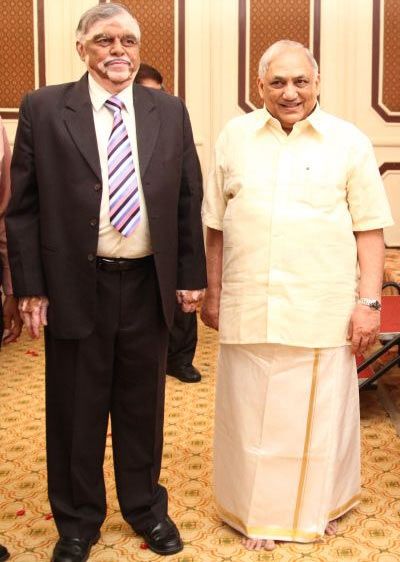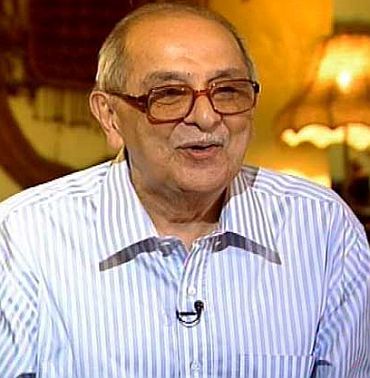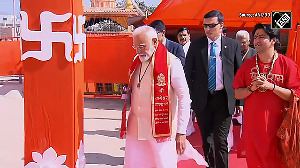
'My question is not why he has accepted the governorship, my question is why did the government offer it to him? By his accepting it, an impression is sought to be created that judges are no better than anyone else and will accept anything.'
Fali Nariman, the legendary lawyer, speaks to Rediff.com contributor Rashme Sehgal exclusively on the controversy over the National Judicial Appointments Bill and former Chief Jusice P Sathasivam's appointment as Kerala governor.
Fali Nariman is convinced the National Judicial Appointments Commission Bill and the Constitutional Amendment Bill seeking to replace the collegium system of appointment of judges to the Supreme Court have been introduced by the Bharatiya Janata Party-led government in order to ensure that politicians have a final say in the appointment of judges at the highest level.
Nariman and four others moved a public interest litigation in the Supreme Court questioning this move to alter the Constitution, but their move was dubbed premature by the highest court.
Nariman, right, below, maintains that the independence of the judiciary is paramount and that judges must be allowed to appoint senior members of the judiciary. He spoke to Rashme Sehgal in an exclusive interview.
You along with other senior lawyers have been extremely upset with the passing of the Judicial Appointments Bill, stating that this would affect the independent functioning of the judiciary?
We lawyers feel strongly about the subject. That feeling cannot be translated into the feelings of judges. Judges have to hold the balance. They have to be judicious. Their view of law is that no writ petition can challenge a Constitutional amendment passed by two Houses of Parliament until the bill is presented to the President and assented to by him because then and only then does it becomes a Constitutional amendment.

It was urged by us that this view was no longer good law. It was a view that had been taken initially in 1967 when the case of Gokulnath held that there was no difference between legislative law and constituent law, that both were laws and that a Constitutional amendment which violated the Fundamental democratic Rights could be struck down by a Constitution amendment because a Constitution amendment was law. This was said by a bench of 11 judges by a majority of 6 to 5.
This view was over-ruled by a 13-member bench which was known as the Kesavananda Bharati case in 1970 again by a narrow majority of 7 to 6. It emphatically said a Constitutional amendment was not law -- it was something different. But the judges in the present case felt a bill amending the Constitution could not be challenged until the President assented to it.
Now we come to the second stage. The court did not go into the merits of the challenge which was that the constituent amendment impinged upon the independence of the judiciary which is a concept that is part of the basic structure of the Constitution and it has been repeatedly upheld by the Supreme Court itself. And that Parliament in its constituent power has no authority to amend the Constitution so as to alter its basic structure.
Law Minister Ravi Shankar Prasad met senior jurists in end-July.
Ravi Shankar Prasad didn't have this bill dated August 8 when he met us on July 27. There were 12 of us at that meeting and they circulated a presentation paper. No one told us anything about the bill. Whether it was in the pipeline was not known. I assume it was not in contemplation which is why I called it a hasty step.
We gave our views that we were supportive of the National Judicial Commission Bill, but with a weightage in favour of the judiciary.
But there has been so much criticism of the collegium system.
We have been debating this business of whether judges have exclusive power to appoint several judges to the higher judiciary as is being done today or whether some other mechanism whereby some other elements should take part in process. This present bill was brought in after discussion on July 27 and was not foreshadowed.
Two former chief justices -- Justice V N Khare and Justice A M Ahmed -- were present. I am not saying Ravi Shankar Prasad suppressed it. He is an honourable man. But I believe it was conceived much later. The provisions were not mentioned. Because all that came on August 8 when it was circulated.
Our main point is we don't like the collegium system at all. The judges have not worked it in a transparent manner. Now that is one end of the pendulum. The 101st Amendment swings the pendulum to the other end, namely it does not give primacy to judicial members in the commission but to the non-judicial members in a commission of six members.
The present bill has three members being from the judiciary. But two of the members of the six can refuse to accept a recommendation made by the remaining four which means that the three senior-most judges of the Supreme Court can be out voted on the question of recommendation of appointment of judges in the high court and judges in the Supreme Court and there goes your independence of the judiciary.
You are on record to say that the Justice M N Venkatachaliah bill was perfect. Why then did the BJP choose to depart from it?
Yes. The same government had initiated the 98th Constituent Amendment Bill in 1998 which almost wholly followed the recommendations of the Venkatachaliah committee appointed by the very same government to make recommendations reviewing the Constitution and in particular reviewing the provisions for appointment of judges of the Supreme Court.
The Venkatachaliah committee had said that the commission should be of five members with a majority of being the three senior most judges of the Supreme Court so there was no possibility of the judiciary being out voted in the matter of appointment of judges. No one up to date has given any explanation as to why this format has not been adopted.
It should have been in the statement of objects and reasons why it could not be passed because it lapsed because elections were called in 1998. Why this change unless politicians want to take complete control?
Why should the BJP have done this turnaround?
Why? Because they were very upset with decision of the Supreme Court decision delivered in 2013 which struck down Section 8(4) of the Representation of People's Act which stated that whereas every person who was convicted of a criminal act and served more than two years of imprisonment would immediately have to vacate his seat though he could appeal against conviction to a higher court.
This was sought to be remedied by a Sibal ordinance approved by the Manmohan Singh Cabinet in 2013, but before the ordinance could be passed it was graphically torn up on television by Rahul Gandhi
All politicians had ganged up on this issue. There is no difference in any particular party, they are all dyed in the same colour. Getting ratifications from state legislatures was very simple because it would be passed by both the Congress and the BJP-held states, that is why this bill meets the needs across all parties because members of Parliament do not want to vacate office.
I would rather go with the judges. If you don't give them a fair weightage, then goodbye to everything.
Is the Judiciary overstepping the line with the Executive?
It is being done in order to avoid the frustration of people when they feel the government is not taking action.
Look at the example of former Chief Justice P Sathasivam who has become governor of Kerala. Several lawyers and jurists believe he got this post because he scrapped the first information report being lodged against BJP President Amit Shah.
I don't believe that accusation. He was a good judge. We are opposing his appointment because by accepting that post, he has diminished the integrity of the judiciary.
The governor is a titular head of the state, but it is best to keep an arm's length distance between the Executive and the Judiciary.
I oppose it not because of him, but because the impression it has created in the mind of the public. He cited the example of former Chief Justice Ranganath Mishra who was elevated to the Rajya Sabha, but two wrongs do not make a right.
He said if he did not take up this post, he would have to return to farming. Do Chief Justices not get a pension from the State?
They get a pension, but that is not enough. A Chief Justice cannot practise in any court. They can give opinions.
But sections of the public believe his appointment is linked with the Amit Shah verdict.
That is not correct. Sixty per cent of the cases in the high courts and the Supreme Court are government cases and a judge will give some decisions in favour of the government and some against.
My question is not why he has accepted the governorship, my question is why did the government offer it to him? There is no shortage of eminent and deserving people.
But by his accepting it, an impression is sought to be created that judges are no better than anyone else and will accept anything.
Is this one more attempt to denigrate the judiciary?
We need to have to have a system which is above this. I don't like the denigration of the judiciary. This diminishes the role of the judiciary and plays into government hands. You cannot reverse this trend.
The Sibal bill is as suspect as the Prasad bill. They are foremost politicians who firmly believe the politicians should be in the driving seat for the appointment of judges.
Are you happy with the way the government has gone about this whole thing?
If they don't do the job, who will do it? We have good hopes the government will do something. It is too early to say. 100 days is too early, hopefully they will perform.
But it is better if each limb of the government does not get along too well with each other.
There has to be tension between the three -- that is Parliament, the Executive and the Judiciary.
But the Supreme Court is the final interpreter of the Constitution. That is final. No one can over-rule that.
Image: Justice P Sathasivam, left, with his mentor, senior advocate K Doraisami. Courtesy: Senior advocate Doraisami..











 © 2025
© 2025